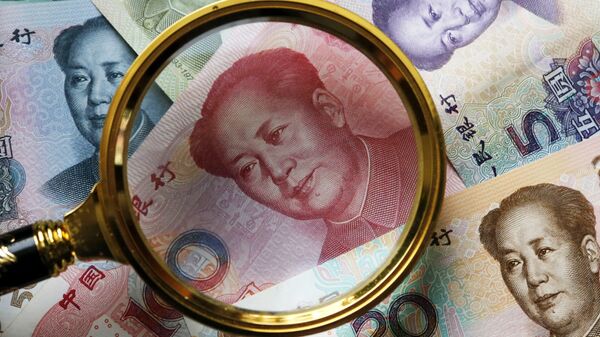In the second quarter of 2020, foreign capital funnelled into the yuan-denominated Chinese government debt surpassed 4.3 trillion yuan ($619 billion), growing at the highest pace since late 2018, according to The Wall Street Journal.
At the end of March just 2.26 trillion yuan ($319 billion) in Chinese onshore debt was held in foreign institutions. The increase in investing activity on the Chinese bond market coincided with a steep 6.8% slump in the first quarter of this year caused by the coronavirus-related economic slowdown. However, China's economy bounced back in the second quarter, with the country's GDP rising 3.2 percent year-on-year, according to the National Bureau of Statistics (NBS) report released on 15 July.
Why China's Yields on Bonds Remain Attractive
The main reason behind the Chinese economy getting back on track and growing interest from foreign investors is that Beijing has managed to cope with the COVID-19 pandemic relatively well, according to Liu Dongmin, head of the Centre for International Finance at the Institute of World Economics and Politics, Chinese Academy of Social Sciences.
"Presently the economic power of the People's Republic of China has increased", Liu stresses. "Therefore, the related financial products are becoming more stable. At the same time, we see that the yield on Chinese government bonds is significantly higher than that on similar securities in Western countries, which, on the one hand, have been hit harder by the epidemic. On the other hand, these economies have been developing for many years at a much slower pace than China. As a result, we see ultra-low, zero, and even negative interest rates".
The epidemic has affected almost all countries. While the United States, the European Union, Japan, and a number of other developed countries have taken a series of measures to tackle the crisis including dropping interest rates to zero or even negative values, China is adhering to a moderate monetary policy and trying to stimulate the economy with fiscal measures. As a result, 10-year Chinese Treasury bonds now offer a yield of 3.118%, while the yields on US, Japanese, and German bonds are 0.597%, 0.023%, and minus 0.515%, respectively.
The Chinese authorities are benefitting from having more foreigners holding Chinese public debt, because this increases the efficiency of management, according to Liu.
"It is undoubtedly very beneficial for us to increase the share of foreign investors among the holders of Chinese bonds because, on the one hand, it plays a positive role in the internationalisation of the yuan, and on the other hand, it shows the quality of governance", he elaborates.
While increasing the share of foreign investors among the holders of PRC debt securities, China will continue to improve debt management, he opines, explaining that when the Chinese learn how to manage debt well, then the demand for these products will increase.

Local Government Bonds Play Important Role in China's Recovery
"I think, apart from the national debt, we can still start offering foreign investors bonds of local governments", Liu adds. "We welcome the purchase of local government bonds by foreign investors on the interbank market, so that China's national and local government debt becomes increasingly safe assets in the eyes of international investors".
Local government bonds are playing an important role in the PRC's post-COVID economic recovery. China's local governments issued around 3.49 trillion yuan (about $496.5 billion) worth of bonds in the first six months of this year, according to the country's Ministry of Finance. The money is expected to be spent on the construction of "new infrastructure": 5G networks, data centres, smart factories, etc. Judging from the total annual quota, approved by the central government, 4.73 trillion yuan ($666 billion) in new local government bonds may be issued this year. This is up 53.6% from last year's quota by value, according to the Global Times.
Still the overall share of foreign holders of Chinese government bonds remains relatively low. This can be put down to it previously being extremely difficult to enter the Chinese market. However, in mid-2017, the country launched the Bond Connect programme which allowed foreigners to invest in the bond markets of mainland China through the Hong Kong market. There's no need now to open a separate trading account in the mainland which has significantly simplified the investment process.
At the same time, last year passive stockholders, who prefer to invest in indices, gained easier access to the Chinese market, since government bonds, as well as the securities of some Chinese state banks, were included in the Bloomberg Barclays aggregate index. A year later, Chinese bonds were included in the JPMorgan index. The aforementioned measures have facilitated the steep increase in the number of foreign holders of China's yuan-denominated sovereign debt.


